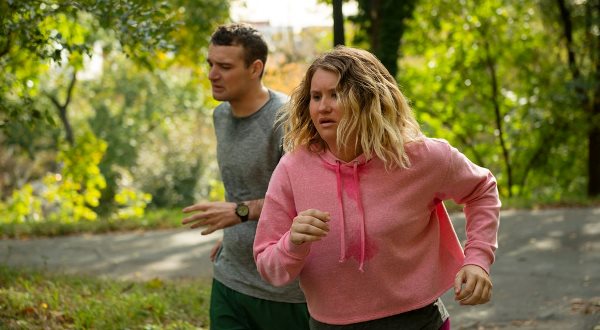This well-meaning comedy-drama centers on an overweight underachiever, Brittany Fogler (Jillian Bell), who takes up running in order to turn her life around. It’s not the easiest feat to pull off as Brittany is not only irresponsible with her drinking and disaffected but downright mean to those who want to genuinely help her.
Already pushing age 30, she’s broke, works a dead-end job, and has neither a romantic partner nor friends who pay more than a passing interest in her. After receiving news of her failing health from a physician, Brittany decides to try and take greater control of her life, starting with getting into better physical shape. But once she discovers just how expensive gym membership are, she opts to start jogging on the streets of New York City instead, yet during her initial foray, her self-consciousness drives her back inside.
Luckily, she gets a running buddy in Catherine (Michaela Watkins), her wise upstairs neighbor whom she had been feuding with previously. Catherine advices ger to set up small goals, and true enough, once Brittany gets that first city block under her belt, a regular exercise routine develops relatively easily. So easily, in fact, that before long she, Catherine, and another new running pal, Seth (Micah Stock), decide to train for the New York City Marathon happening in one year’s time. Brittany also starts shedding weight (she has a targeted loss goal of about 50 pounds), but her happiness is never entirely contingent on how thin she becomes—or for that matter, whether she completes the famed five-borough race. Rather, writer-director Paul Downs Colaizzo puts her on the path to making peace with a tragic event from her past, as well as learning to at last love herself.
To Colaizzo’s credit, these are arguably more difficult milestones for Brittany to reach. However, given that her arc is really about self-actualization, it makes one question whether the film also needed to have dramatic weight loss as a major plot point. (Not to give away too much, but what Brittany ends up weighing has little bearing on whether she gets admitted into the marathon.) Had Bell played a version of the character with just the emotional baggage, the film would have still worked. It would also have eliminated the need to put the actress in a not-always-convincing fat suit for Brittany’s pre-weight loss scenes.
The prosthetics are also problematic in that the movie, despite ostensibly being against fat-shaming, has moments in which it seemingly wants viewers to look at Brittany’s plus-sized body and feel revolted. During the scene in which she’s getting ready for her first-ever run, the filmmakers employ extreme close-ups of her getting into her sweats, her excess skin pouring out of her clothes. At a moment in which Brittany is about to do something that should be considered heroic, it’s a creative decision that undermines the character.
Brittany Runs a Marathon does have some strengths, starting with Bell, who often makes scenes funnier by playing them as straight as possible. At one point, after Brittany tries talking the aforementioned doctor into an Adderall prescription for her lethargy, he starts explaining that some people abuse it, and Bell has a look of such exaggerated shock that it cannot help elicit a laugh. The moment that garnered the biggest laugh at the screening I attended features an emotional Brittany telling Catherine about a failed attempt to adopt a dog from a kill shelter. The facility refused because Brittany couldn’t, in its estimation, give the dog a quality of life it deserved. Bell doesn’t tell the story like a stand-up comedian emphasizing the darkly ironic punch line; she makes it sound like Brittany really wanted the dog.
Bell is surrounded by a solid supporting cast, who unfortunately are playing flat characters. The twist regarding Catherine’s seemingly ideal existence is visible from a mile away. As for Seth, he offers boundless moral support to Brittany, and while that isn’t insignificant, the earnest turn his character takes is disappointing given the neurotic, rubber-faced goofiness he shows early on. (Sadly, an unintentional theme seems to be that exercise makes these characters less interesting.) Meanwhile, Brittany’s on-again, off-again roommate (Alice Lee) is blandly horrible: self-absorbed from the start, she explodes with verbal malice at the first instance that Brittany challenges her to see their friendship on more equal terms. More compelling is Utkarsh Ambudkar as someone Brittany meets during a long-term house-sitting job and finds repulsive at first, possibly because she sees something of herself in his slacker ways.
Overall, the film works better as a character study of someone whose bravado and endless wisecracks are an emotional defense mechanism against a society that treats unconventional-looking people with disdain. There are subtle reminders, including strangers who repeatedly let subway doors close in Brittany’s face. Yet even as she loses weight, she never quite reaches a point where she is simultaneously funny and comfortable in her own skin. It makes her emotional journey feel incomplete (although at least by the denouement, we get the sense that she is starting to get there).
The finale tries to re-create the excitement of the marathon, but as someone who has gone out to see it, I was disappointed by the film’s sanitized approach. Every year, the race draws runners of all shapes, sizes, and ages, as well as ones with eccentric fashion senses, but based on the crowd Brittany finds herself among, you would think that only serious athletes or aspiring actors sign up. As a longtime New Yorker, I can proudly say that our city has its share of freaks and weirdos, but apparently, those are not the types that the new-and-improved Brittany Fogler should be around. That’s both her loss and the film’s.

















Leave A Comment